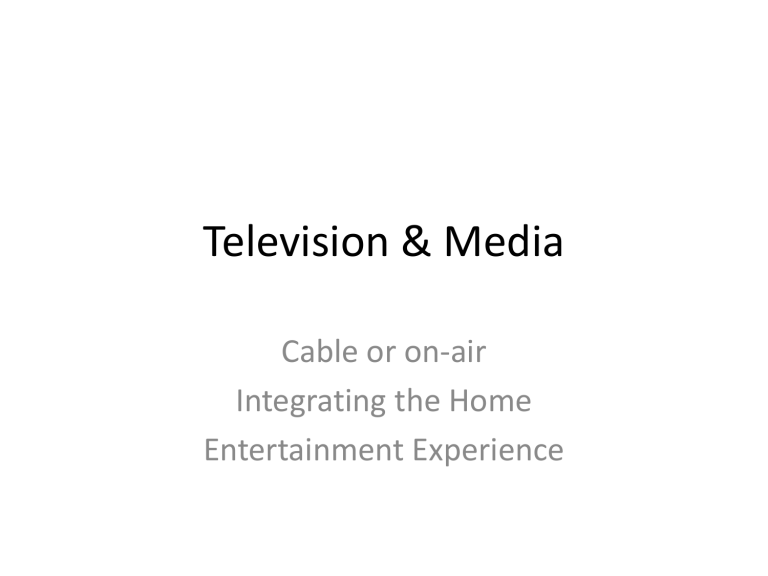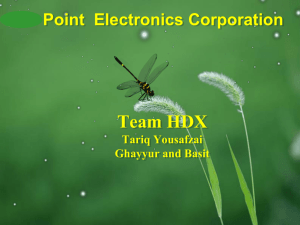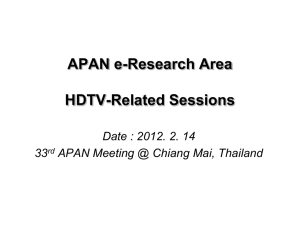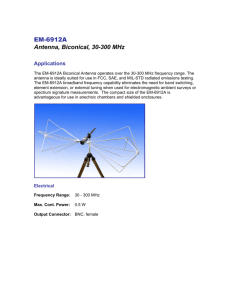Television & Media - Promised LAN Computing, Inc

Television & Media
Cable or on-air
Integrating the Home
Entertainment Experience
Section 1
Cable/Satellite TV source
Or
On-Air Antenna and Internet
Cable/Satellite bills are monthly
• By the time all services are added:
• Television (and HDTV)
• Pay channels/movies, etc.
• Set-top box/DVR
• Internet access (slow, 15meg, 30meg, ??)
• Telephone service
• Security services
• All together add up to $$$$ EVERY month
The Old-Fashioned FREE TV will work
• Antenna – in the New Bern area, a roof-top or similar antenna is needed for maximum stations.
• Proper distribution system (RF)
• What kind of receiver is needed (Digital – ATSC tuner).
• Advantages (and drawbacks)
Lots of non-working solutions
• There are a multitude of different small outdoor antennas available now with built in rotation, all seem to be coming from China, and reception is about as good as hooking up the antenna lead to a wet noodle.
• Go back to the old-fashioned Channel Master,
RCA, Wingard, etc. Antennas – and bigger ones
• A rotator may be needed – especially with large antenna.
USELESS “150 mile” Antenna
WITN suggested Antenna – UHF ONLY
Another UHF ONLY Antenna
Recommended 110” Boom
Antenna Grounded to earth
Smaller Antenna - Shop
Need an outdoor Balun
Roof Mount & Mast
RG-6 Cable & Connectors
The different TV standards
• Analog (no longer usable in the US)
• The US standard was called NTSC (the joke was that it stood for “never twice the same color.”
• It served us for decades, but Congress and the
FCC have discontinued its use completely
• Other countries used PAL and SECAM, which were similar, but not interchangable.
The new TV standards
• Digital (but there are multiple resolutions).
• Cable systems internally use a method called
QAM, which may be encrypted.
• On-the-air broadcasts use a method called
ATSC.
• Many (but not all) devices can be set to receive either or both.
How many channels? (24)
AntennaPoint.com
FCC.gov website
“Virtual” Channels
• The new Digital TV features “virtual channels” where the actual transmitted channel frequency may not be what is displayed, AND each transmitter site may be sending out more than one channel.
• Some of these channels may be HDTV, others may be SDTV (usually each transmitter can have one HD and several SD).
Other stations in eastern NC
• 2-1, 2, 3 – WUND-DT PBS (covered by 19)
• 8-1 – WFXI-DT Fox (covered by 14-1)
• 25-1, 2, 3 – WUNK-DT PBS (covered by 19)
• 35-1, 2, 3 – WPXU-DT Ion (covered by 38)
• Channel 8 is way out in another direction
(Atlantic, NC) from all the others.
• Channels, 2, 25, and 35 duplicate programming on stronger channels.
AntennaWeb use
Most stations in 2 azimuths
WCTI – three virtual channels
WITN – three virtual channels
WNCT – two virtual channels
WUNM – three virtual channels
WYDO – two virtual channels
WEPX – five virtual channels
WUNK – same three PBS
Fox – tower in Atlantic, NC
New stations are being added
Three more channels (when on)
RF Amplifier (4 outs)
RCA Amplifier (NLA)
Another RF Amplifier - good
Not-so-good RF Amplifier
Passive Splitter – signal loss
Costs
• SuddenLink (HDTV, DVR, Internet, Phone) approximately $173 per month.
• SuddenLink (Internet, Phone only) approximately $90 per month.
• Antenna, mount, pole, cable, grounding, amplifiers, coax total $250
• Payback time: 3 months. (these figures did not include the three new LED HDTV sets, with them it becomes 2.5 years).
What is lost?
• Approximately 200 total cable channels, of which we regularly watched stuff on a dozen of them.
• Fox News, CNN, Weather Channel – all can be replaced using computer on Internet.
• Most of the movies no longer available through SL we can still watch with Netflix.
What is gained?
• Free on-air TV, no monthly charges.
• Free DVR recording, no monthly charges.
• Ability to playback the DVR recordings from any Windows 7 or 8 computer in the network.
• Ability to share pictures, videos, audio media between all computers and display on TVs
• BIG monitors on the computers with high resolution.
Section 2
Integrating the Home
Entertainment Experience
Stuff that was removed/replaced
• Old televisions that were not compatible with on-air use and without HDMI inputs. Included
55” Mitsubishi Projection HDTV monitor,
Samsung 27” CRT type HDTV monitor, 9”
Toshiba CRT type TV/DVD player.
• SuddenLink Cable box (removed, not replaced).
Stuff that was still usable
• DVD Player (2 good old ones that don’t cut off content from other regions).
• 5.1 Channel A/V Onkyo sound system with
B&W front, rear, center speakers and custom
15” powered sub-woofer.
• Cassette Deck.
• Various connecting cables.
• Samsung 24” LCD HDTV (1920x1808) (moved from MBR to shop)
Stuff that was added
• Windows 8 multi-media computer with
Windows Media Center added and with ATSC compatible TV Tuner. This also provides the
DVR capability and BluRay playback.
• Samsung 55” LED HDTV (1920x1080 res)
• Samsung 39” LED HDTV (1920x1080 res)
• Samsung 32” LED HDTV (1920x1080 res)
Things we can do
• Record TV Programs, play back on ANY of the
Windows 7 or 8 computers, home or shop.
• Share Videos, Pictures, Windows Media
Center recorded CDs, any other type media between all the various computers and the
Living Room 55” HDTV (not a “SmartTV” but does have media sharing features).
• Store these media anywhere convenient.
Now – for some detail
HOW to make it all work
Antenna and RF Wiring
• A good antenna, mount, mast, coax, ground wire, ground rod, and hardware were purchased.
• Install requires climbing on the roof. Chimney or eave mounts could have been used.
• Antenna direction was established using a military style compass, set half way between the directions to Trenton and Grifton.
RF Wiring
• The RG-6U antenna cable goes to the input of an RCA amplifier, outputs go to LR TV, MBR TV,
BR TV, and 2 nd RCA Amplifier. Outputs go to
Computer ATSC, Computer FM, A/V Receiver
FM, 4 th is a spare.
• High Quality RG-6 and connectors are needed.
The new style connectors are superior, but require a special crimping tool.
HDMI Cabling
• There are several generations of HDMI cabling. Only recent high quality cables should be used. Older ones won’t support audio and network over the cable. These cables are somewhat fragile.
• There are also three sizes of HDMI cable.
Some adapters may well be useful in connecting external gadgets, such as iPads or
Android tablets.
HDMI Connector Types
Computer DVI to HDMI
DisplayPort to HDMI
Standard
Displayport Types
Mini
Analog VGA is a no-no (because of
HDCP copy protection)
Replaced Video Board
• The Windows 8 computer originally shipped with Vista – the supplied video card did have
HDMI output, but did not support audio over
HDMI (needed so one can easily control the volume and mute sound). This card also had dropouts when playing back HD recordings.
• Replaced with an ATI Fireview V3900 with 1G
RAM, DVI and Displayport outputs.
Displayport into HDMI adapter, supports audio
55” HDTV Back
55” HDTV Connection Panel
32” HDTV Connections
Older 24” HDTV Connections
Most New TVs – NO analog audio out
TOSlink optical Digital RCA coaxial Digital
Component Video Connections
RCA Audio Connections
“Banana” Speaker Connections
Not enough HDMI Inputs?
Hide it in furniture
Opened
55” in Living Room
HDTV Source Menu
Windows 8 in BIG!
Center & Right Front Speakers
Right Rear Speakers
Left Rear Speakers
Left Front Speakers
15” 200w SubWoofer
MBR Computer/32” HDTV
39” HDTV/Monitor
19” & 24” in shop
Windows 8.1 Upgrade
• 17 October, 2013 available through the
Microsoft Store (Microsoft updates must be current before it will show).
• The next few slides are to show changes in the interface to the user.
The new Start screen
Left side of screen Right side of screen
The Apps screen
Left side of new Apps screen Available by link from Start
The Desktop remains similar
Some of the changes made
• The Start Menu is (partially) back.
• Up to 8 Modern UI programs can be snapped on the screen instead of only 2.
• Modern UI programs more visually oriented.
• SkyDrive is more tightly integrated, it can also sync Windows and Apps settings.
• Lots of little help windows for newbies (hope they can be turned off).
Promised LAN Computing, Inc.
• Email: jcason@promlancomp.com
• Web: http://www.promlancomp.com
• All rights reserved, copyright 2013.


